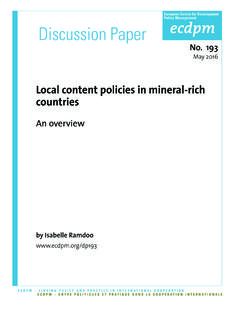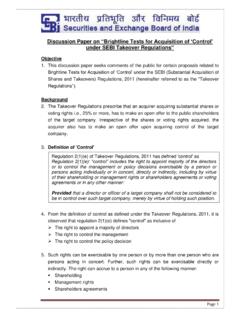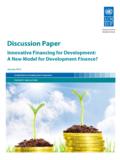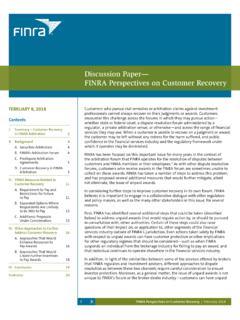Transcription of BEPS ACTION 6 - OECD.org
1 BEPS ACTION 6. discussion draft on non-CIV. examples 6 January-3 February 2017. 6 January 2016. FOLLOW-UP WORK ON THE INTERACTION BETWEEN THE TREATY. PROVISIONS OF THE REPORT ON BEPS ACTION 6. AND THE TREATY ENTITLEMENT OF NON-CIV FUNDS. Paragraph 14 of the final version of the Report on ACTION 6 (Preventing the Granting of Treaty Benefits in Inappropriate Circumstances) indicated that the OECD would continue to examine issues related to the treaty entitlement of non-CIV funds to ensure that the new treaty provisions included in the Report on ACTION 6 address adequately the treaty entitlement of these funds.
2 As part of the follow-up work on this issue, on 24 March 2016 the OECD published a consultation document on the treaty entitlement of non-CIV funds which included a number of specific questions related to concerns, identified in the comments received on previous discussion drafts related to the Report on ACTION 6, as to how the new provisions included in that Report could affect the treaty entitlement of non-CIV funds as well as possible ways of addressing these concerns. The comments received in response to that consultation document were published on the OECD website on 22 April 2016.
3 This discussion draft has been prepared to provide stakeholders with information on the subsequent developments in the work on the interaction between the treaty provisions of the report on BEPS ACTION 6 and the treaty entitlement of non-CIV funds, including the conclusions reached at the May 2016 meeting of Working Party 11 and the subsequent work on the development of examples related to the application of the principal purposes test (PPT). rule included in the Report on ACTION 6 with respect to some common transactions involving non-CIV funds. The discussion draft invites comments on three draft examples under consideration by the Working Party for inclusion in the Commentary on the PPT rule.
4 The Committee invites interested parties to send their comments on these three examples. The draft examples and the comments received will be discussed by Working Party 1 at its February 2016 meeting. Comments should be sent by 3 February 2017 at the latest by email to in Word format (in order to facilitate their distribution to government officials). They should be addressed to the Tax Treaties, Transfer Pricing and Financial Transactions Division, OECD/CTPA. Please note that all the comments received on this discussion draft will be made publicly available. Comments submitted in the name of a collective grouping or coalition , or by any person submitting responses on behalf of another person or group of persons, should identify all enterprises or individuals who are members of that collective group, or the person(s) on whose behalf the commentator(s) are acting.
5 The draft examples included in this discussion draft do not, at this stage, represent the consensus views of the CFA or its subsidiary bodies but are intended to provide stakeholders with substantive proposals for analysis and comment. 1 Working Party No. 1 on Tax Conventions and Related Questions is the subsidiary body of the OECD's Committee on Fiscal Affairs responsible for the tax treaty-related work, including the follow-up work on BEPS ACTION 6. 1. FOLLOW-UP WORK ON THE INTERACTION BETWEEN THE TREATY. PROVISIONS OF THE REPORT ON BEPS ACTION 6. AND THE TREATY ENTITLEMENT OF NON-CIV FUNDS.
6 1. The objective of the work that was done with respect to the interaction between the treaty provisions of the Report on BEPS ACTION 6 and the treaty entitlement of non-CIV funds was set out in paragraph 14 of the Report on ACTION 6. As that paragraph notes: there is a need to continue to examine issues related to the treaty entitlement of non-CIV funds to ensure that the new treaty provisions that are being considered adequately address the treaty entitlement of non-CIV funds. The continued examination of these issues would also address two general concerns that governments have about granting treaty benefits with respect to non-CIV funds: that non-CIV funds may be used to provide treaty benefits to investors that are not themselves entitled to treaty benefits and that investors may defer recognition of income on which treaty benefits have been granted.
7 (Emphasis added.). 2. This objective is the reason why Working Party 1 and the March 2016 consultation document focused on how the limitation-on-benefits (LOB) and principal purposes test (PPT) rules included in the Report on ACTION 6 might inadvertently affect non-CIVs and why the most urgent issue was how to address any such inadvertent effects before the inclusion of these rules in the multilateral instrument that was under negotiation to implement the tax treaty-related BEPS recommendations (the MLI). 3. The text of the MLI was adopted on 24 November 2016 (see the news release on the adoption of the MLI and the text of the MLI).
8 As can be seen from the provisions of the MLI, whilst the MLI includes the PPT rule and the provisions of the simplified LOB rule that were included in the final version of the Report on ACTION 6, it does not include the provisions of the detailed LOB rule that was included in that report. This reflects the conclusion that, given the number of bilateral decisions that are involved in designing a detailed LOB rule (including decisions related to the content of the CIV subparagraph of the definition of qualified person 2), the multilateral instrument was not an appropriate instrument for the implementation of the detailed LOB rule.
9 4. At its May 2016 meeting, Working Party 1 discussed the main themes raised in the public comments submitted in response to the March 2016 public discussion draft . The Working Party concluded that since the MLI would not include the provisions of the detailed LOB rule, this removed the pressure to design a multilateral solution to the issue of the treatment of non-CIV funds in the detailed LOB provision, noting that a statement concerning the need to address the issue bilaterally could be included in the next update of the OECD Model Tax Convention on Income and on Capital (the OECD Model), which is tentatively scheduled for mid-2017.
10 5. At the same time, Working Party 1 concluded that, as regards the provisions of the simplified LOB rule, the derivative benefits provision included in that rule,3 which does not include any limit on the number of equivalent beneficiaries, any base-erosion test or any requirement related to intermediate owners, meant that few non-CIV funds would fail to qualify for treaty benefits under that rule. The 2 See paragraphs 31 to 43 of the Report on ACTION 6. 3 The derivative benefits test in the simplified version of the LOB provision provides as follows: 3. A resident of a Contracting State that is not a qualified person shall nevertheless be entitled to a benefit that would otherwise be accorded by this Convention with respect to an item of income if persons that are equivalent beneficiaries own, directly or indirectly, more than 75 per cent of the beneficial interests in that person.

















